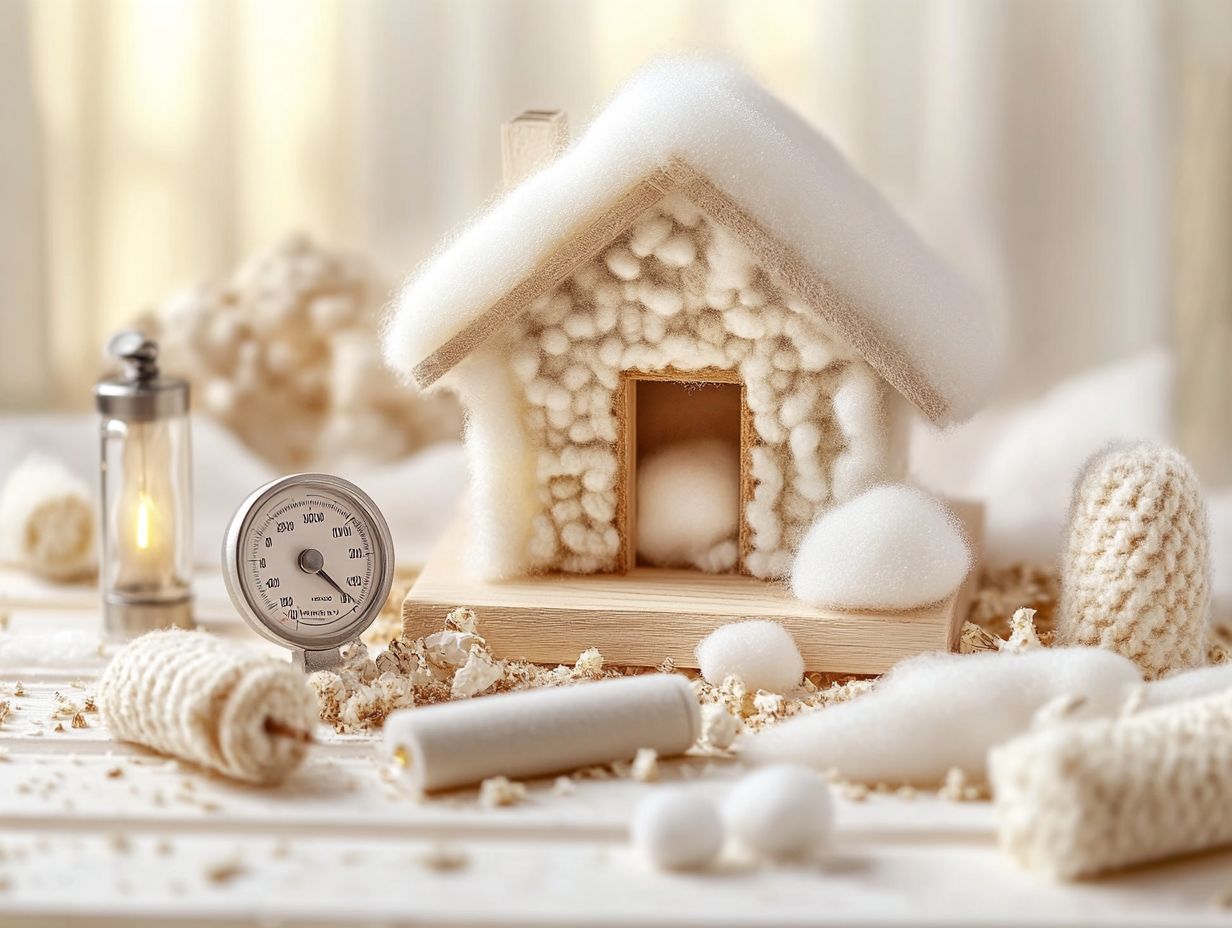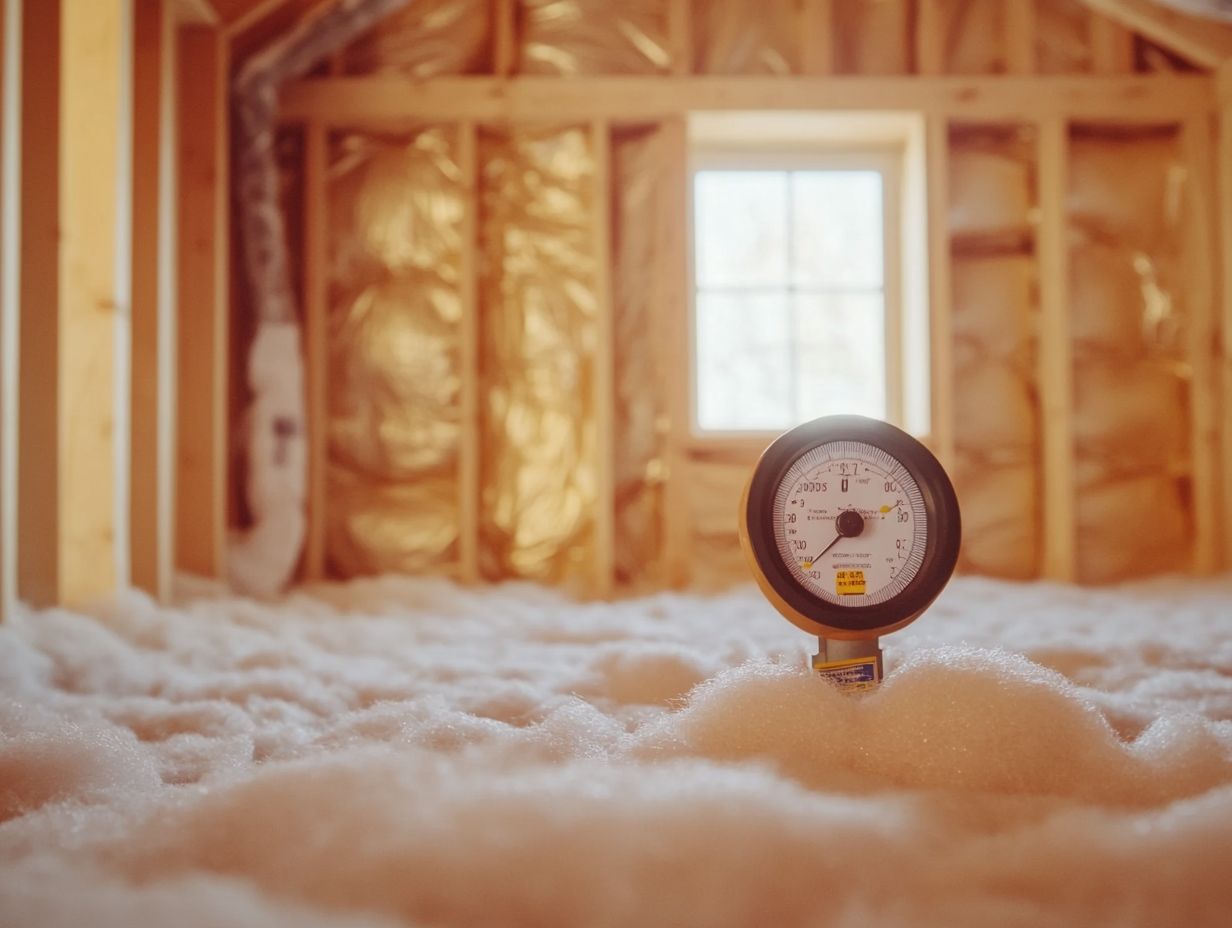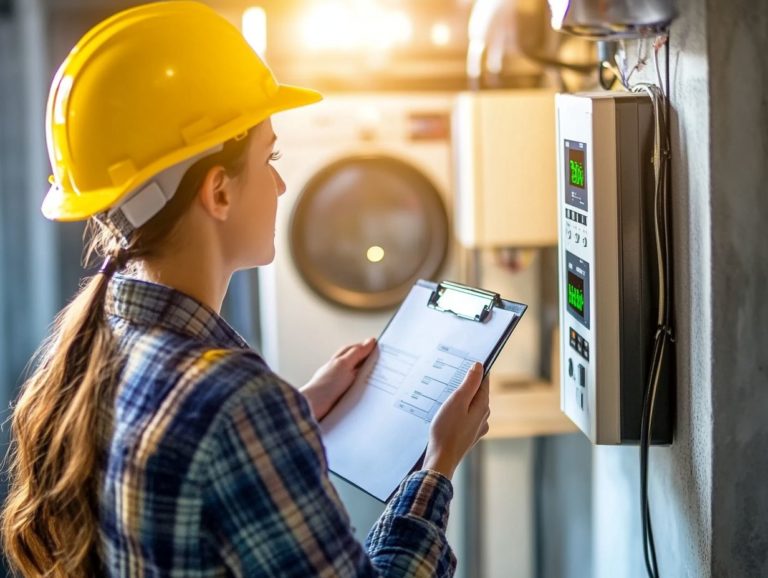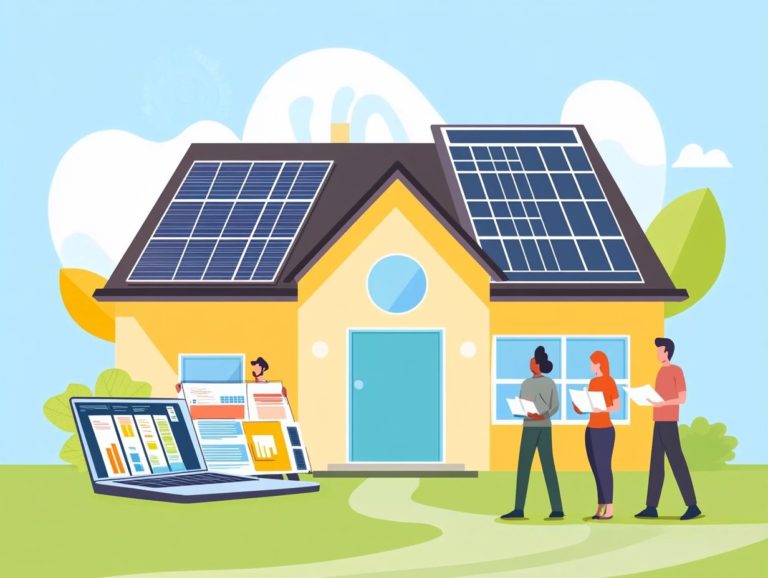What are the Common Misconceptions about Insulation?
Insulation is frequently misunderstood, yet it is essential for achieving a comfortable and energy-efficient home.
It s a common belief that insulation is only vital in colder climates or that all insulation materials are created equal. This conversation aims to clarify these misconceptions and underscore the true significance of proper insulation.
From boosting energy efficiency and improving indoor air quality to helping you choose the right materials, you ll explore everything necessary to ensure your home is impeccably insulated.
Contents
- Key Takeaways:
- Understanding Insulation
- Common Misconceptions about Insulation
- The Importance of Proper Insulation
- Choosing the Right Insulation for Your Home
- Preguntas Frecuentes
- Cu les son los conceptos err neos comunes sobre el aislamiento?
- Es cierto que el aislamiento solo es necesario en climas fr os?
- Puede cualquier tipo de aislamiento mejorar la eficiencia energ tica?
- El aislamiento solo es til para mantener un edificio caliente?
- El aislamiento es una soluci n de talla nica?
- Solo necesito aislamiento para construcciones nuevas?
- Es costoso el aislamiento y no vale la pena la inversi n?
Key Takeaways:

Insulation is not just for keeping a home warm in cold climates; it also helps regulate temperature in all types of climates. Not all insulation materials are the same, so it’s important to consider factors such as R-value, durability, and air permeability when choosing the right insulation for your home.
Proper insulation can lead to significant cost savings, improved indoor comfort and air quality, and decreased energy consumption.
Understanding Insulation
Understanding insulation is essential for optimizing energy efficiency in your building, as it directly impacts heat transfer and overall comfort.
Insulation significantly reduces heating and cooling costs while enhancing indoor air quality and minimizing environmental impact. You should evaluate your insulation needs and consider seeking professional advice to ensure effective installation and maintenance techniques that suit your specific climate and building characteristics.
Different insulation materials come with varying R-values, which measure insulation’s ability to resist heat flow. These values play a crucial role in their effectiveness at minimizing heat loss and improving energy performance.
What is Insulation and How Does it Work?
Insulation is your ally when it comes to enhancing your building’s energy efficiency and maintaining a comfortable indoor climate year-round.
You ll find a variety of insulation materials available today, each with its own unique benefits. Take fiberglass, for instance; it typically boasts an R-value of about 2.9 to 4.3 per inch, making it quite effective at resisting heat flow.
If you re seeking something with even greater performance, consider spray foam, which can achieve R-values between 5.5 and 6.5 per inch. This option excels in its ability to expand and fill any gaps, providing excellent thermal resistance.
Investing in proper insulation not only elevates your comfort by reducing those pesky drafts, but it also contributes to significant energy savings. You’ll be amazed at how much your energy bills can drop as your HVAC system operates more efficiently, requiring less energy to maintain your ideal temperatures.
Common Misconceptions about Insulation
Many homeowners often harbor misconceptions about insulation that can lead to misguided choices concerning energy efficiency and overall comfort in their homes. This is especially true when it comes to understanding how insulation performs under different climatic conditions.
Myth #1: Insulation is Only Important in Cold Climates
A common misconception is that insulation is only advantageous in cold climates, but the truth is that effective insulation is just as crucial in warm climates. It plays a key role in managing cooling costs and ensuring your home remains comfortable.
Insulation does much more than just keep the heat in during winter; it acts as a protective barrier against the sweltering summer heat. With the right insulation, you can minimize temperature fluctuations, which not only reduces energy consumption but also lowers your utility bills.
Using high-quality insulation materials can create a quieter living environment, further enhancing your overall comfort. By choosing these materials, you re also contributing to environmental sustainability, as reduced energy usage leads to lower carbon emissions.
Ultimately, effective insulation is a vital element in achieving year-round efficiency, making your home more resilient against the elements.
Myth #2: All Insulation Materials are the Same

Not all insulation materials are equal. The differences in their performance, R-values (a measure of how well insulation resists heat flow), and installation methods can greatly influence your energy efficiency and indoor air quality.
Take fiberglass insulation, for example. It s a popular choice thanks to its non-combustible nature and impressive heat retention ability.
Spray foam insulation excels at sealing air leaks. It fills those pesky gaps and corners that traditional methods often overlook.
This unique feature not only boosts energy efficiency by reducing drafts but also enhances your indoor air quality by preventing moisture buildup and mold growth.
To truly assess insulation effectiveness, methods like blower door tests and thermographic inspections come into play, enabling you to make informed decisions based on real performance metrics.
In summary: Different insulation materials serve varied purposes, affecting your home’s energy efficiency year-round.
Myth #3: Insulation is Only for Keeping a Home Warm
You might believe that insulation’s primary job is to keep your home warm, but it actually plays a vital role in keeping your indoor spaces cool during the scorching summer months. This minimizes heat transfer, helping maintain your desired temperature inside, regardless of the season.
In winter, insulation prevents precious heat from escaping, ensuring your rooms stay comfortably warm without draining your energy budget.
During sweltering summer days, insulation acts as a protective barrier against outside heat, easing the load on your air conditioning systems. This dual role creates a more stable indoor environment and significantly reduces cooling costs.
In summary: Insulation is essential for both warmth in winter and coolness in summer, making it crucial for energy conservation.
Myth #4: Insulation is Only for New Construction
You might think insulation is just a concern for new constructions, but existing homes can benefit greatly from upgrading and maintaining their insulation. Older homes often suffer from inadequate insulation, resulting in substantial heat loss during winter and increased cooling demands in summer.
By focusing on the building envelope and ensuring it s properly insulated, you can enjoy a more stable indoor temperature while slashing your energy bills. Upgrading insulation enhances comfort levels and minimizes annoying drafts.
Regular maintenance of your insulation is crucial for optimizing energy efficiency and safeguarding your home s structural integrity long-term.
In summary: Insulation is vital for both new and existing homes; upgrading it can lead to significant energy savings.
The Importance of Proper Insulation
Proper insulation goes beyond simply creating a comfortable indoor atmosphere. It plays a vital role in enhancing energy efficiency and ensuring substantial savings on your energy bills year-round.
Energy Efficiency and Cost Savings
The financial advantages of energy efficiency through quality insulation can lead to significant savings on your energy bills while reducing your home s environmental impact.
By ensuring your spaces are well-insulated, you can decrease your reliance on heating and cooling systems often the largest culprits of energy consumption. Effective insulation minimizes energy waste, resulting in lower utility costs month after month.
As you reduce the energy required for climate control, you also lower your overall carbon footprint, contributing to a greener planet. This strategic approach enhances your financial well-being while supporting wider efforts toward environmental sustainability.
Is your home losing heat? Check your insulation today!
Indoor Comfort and Air Quality

Proper insulation not only helps you maintain a stable indoor temperature but also enhances the quality of your indoor air by preventing moisture damage and temperature fluctuations.
This essential feature protects you from external temperature changes while working diligently to keep humidity at bay. This is vital for preventing mold growth that can adversely affect respiratory health.
By creating a barrier that restricts the flow of warm, moist air during summer and cold, dry air in winter, insulation becomes a fundamental aspect of safeguarding your living environment.
A well-insulated space allows for consistent heating and cooling. This minimizes the energy required for climate control, ensuring that you breathe cleaner air free from allergens often exacerbated by excessive moisture.
Choosing the Right Insulation for Your Home
Choosing the right insulation for your home requires a thoughtful evaluation of several key factors, including energy efficiency and climate.
Careful consideration will help you achieve optimal performance and comfort in your living space.
Factors to Consider
Your climate, existing insulation, and specific needs are key factors to weigh when selecting insulation. Effective heat retention and energy savings depend on these elements.
Understanding your local climate is essential, as different insulation types perform quite differently depending on the temperature and humidity levels.
For example, in colder regions, opting for materials that offer superior heat retention is crucial to prevent heat loss. Meanwhile, in warmer climates, it’s all about effective cooling and moisture control.
Take a moment to evaluate the condition of your current insulation; this helps you decide if improvements are needed or if a complete replacement is required.
Consider your energy needs, as high-quality insulation not only enhances comfort but also reduces utility bills and minimizes your environmental footprint. These are pivotal factors that will ultimately guide your choice of insulation materials.
Types of Insulation Materials
You have a range of insulation materials at your disposal, including fiberglass and spray foam, each boasting unique properties and R-values, which measure insulation effectiveness.
These materials fulfill various roles in residential settings, addressing diverse needs like thermal regulation and soundproofing.
For example, fiberglass is a popular choice for attics and walls, thanks to its affordability and reasonable R-value. On the other hand, spray foam insulation shines when it comes to sealing gaps and enhancing energy efficiency, making it particularly suitable for basements and crawl spaces.
As you navigate your insulation options, it s essential to consider factors such as installation method, moisture resistance, and environmental impact. These elements are pivotal in determining your home’s energy efficiency and comfort, ensuring you make a choice that truly meets your needs.
Preguntas Frecuentes
Cu les son los conceptos err neos comunes sobre el aislamiento?

- El aislamiento solo es necesario en climas fr os.
- Cualquier tipo de aislamiento mejorar la eficiencia energ tica.
- El aislamiento solo es til para mantener un edificio caliente.
- El aislamiento es una soluci n de talla nica.
- El aislamiento solo se necesita para construcciones nuevas.
- El aislamiento es costoso y no vale la pena la inversi n.
Es cierto que el aislamiento solo es necesario en climas fr os?
No, el aislamiento es importante en todos los climas. En climas c lidos, ayuda a mantener el aire fresco en el interior y reduce la necesidad de aire acondicionado. De hecho, algunos tipos de aislamiento est n dise ados espec ficamente para climas c lidos.
Puede cualquier tipo de aislamiento mejorar la eficiencia energ tica?
No, el efecto del aislamiento depende de factores como el material, el grosor y las t cnicas de instalaci n.
Es crucial elegir el tipo correcto de aislamiento y hablar con un experto para garantizar una instalaci n adecuada.
El aislamiento solo es til para mantener un edificio caliente?
El aislamiento es esencial para mantener un edificio caliente en climas fr os.
Tambi n ayuda a mantener un ambiente fresco en climas c lidos, regulando la temperatura y reduciendo energ a.
El aislamiento es una soluci n de talla nica?
No, no existe una soluci n de talla nica para el aislamiento.
Diferentes tipos son adecuados para diferentes aplicaciones, dependiendo del clima, la estructura y el presupuesto.
Solo necesito aislamiento para construcciones nuevas?
No, puedes instalar aislamiento en edificios existentes.
Agregar aislamiento en un edificio antiguo puede mejorar significativamente su eficiencia energ tica y reducir costos.
Es costoso el aislamiento y no vale la pena la inversi n?
Instalar aislamiento tiene un costo inicial, pero los ahorros en las facturas de energ a son valiosos.
El aislamiento tambi n aumenta el valor de la propiedad, as que considera los beneficios a largo plazo.






